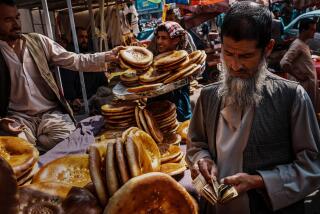Karzai’s Huge Task
- Share via
The grand council, or loya jirga, that established a transitional government for Afghanistan demonstrated the problems and promise of a nation devastated by more than two decades of war. Feuding among ethnic factions, a staple of Afghan history, remains one of the biggest problems. The willingness of more than 1,500 delegates to spend a week debating visions of a future Afghanistan displayed the potential for a broadly representative government.
In December, foreign nations meeting in Bonn picked Hamid Karzai as Afghanistan’s interim ruler. Last month, Afghans in Kabul elected Karzai president until the nation holds full-fledged elections in 2004. It’s unfortunate that U.S. officials were so heavy-handed in pushing aside opposition to Karzai and ensuring that the former king, Mohammad Zaher Shah, remained on the sidelines. Still, Karzai has done a good job in starting the rebuilding of his shattered country and extracting promises of financial aid from foreign governments.
He also did well to remove the Tajik interior minister and replace him with a Pushtun, the nation’s majority ethnic group. Tajiks still wield disproportionate influence in Karzai’s Cabinet, a recognition of their major role in fighting the Taliban rulers for years before the United States and its allies intervened after Sept. 11. If Karzai wants the nation to view his Cabinet as representative, he needs to correct the ethnic balance.
He also must distance himself from the warlords trying to establish fiefdoms throughout the country. The United States could assist by ending its opposition to deploying international peacekeepers anywhere in Afghanistan other than Kabul, the capital.
Afghans angered at America’s too-public support for Karzai were enraged when U.S. aircraft last week accidentally killed dozens of civilians while flying in support of troops hunting for Al Qaeda and Taliban operatives. Such incidents are a part of all wars. U.S. forces were quick to investigate why a gunship strafed the town--the crew reported receiving antiaircraft fire--and to offer assistance to those wounded.
Such needless civilian casualties, of course, undercut the loya jirga in its difficult job of deciding how to rebuild the nation’s political institutions. But the return of the Taliban or Al Qaeda would be disastrous.
After its 10-year war against Soviet invaders, years of fighting between warlords and then U.S. intervention, what Afghanistan needs most is the stability to educate its young, grow its crops, open factories and create a peaceful civil society.
More to Read
Sign up for Essential California
The most important California stories and recommendations in your inbox every morning.
You may occasionally receive promotional content from the Los Angeles Times.













